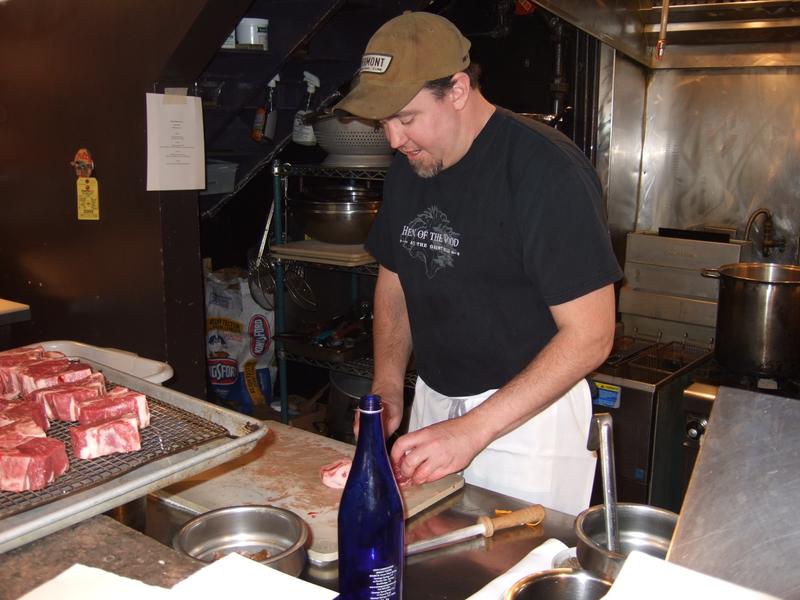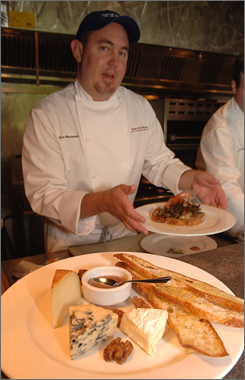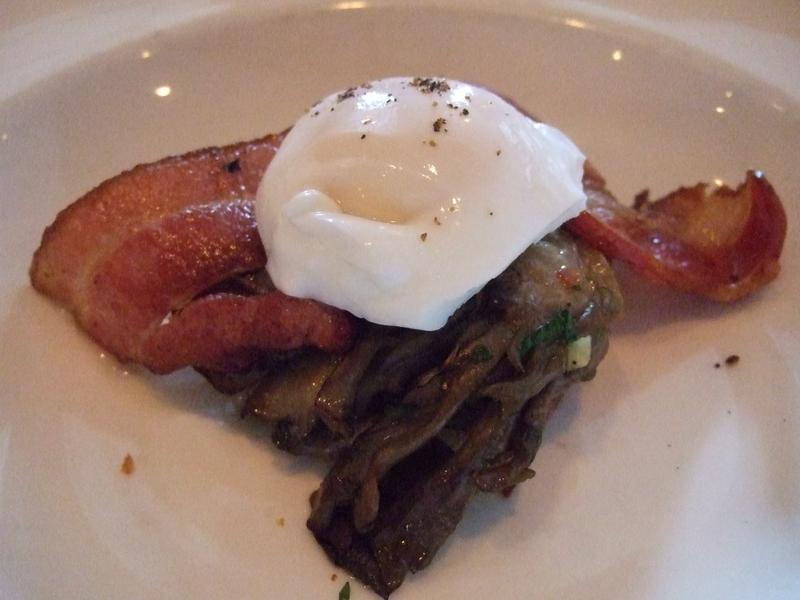Chef Eric Warnstedt, Hen of the Wood, Woodbury, Vermont
 I met with Chef Steve Atkins yesterday. Invariably, during the course of our conversation your name came up, as you used to work for him. I found it interesting that here are two chefs, who worked together, and both are nominated for a James Beard Award. Your restaurants are virtually only a few miles apart in rural Vermont.
I met with Chef Steve Atkins yesterday. Invariably, during the course of our conversation your name came up, as you used to work for him. I found it interesting that here are two chefs, who worked together, and both are nominated for a James Beard Award. Your restaurants are virtually only a few miles apart in rural Vermont.
That's the only other restaurant that I go to, besides a brew pub here that has some really outstanding beer. I don't really dine out too much anymore.
A lot of chefs that we talk to, have the desire to go out, but as chef/owner they don't really have the time.
There are only so many options up here (Waterbury area of Vermont). I feel like the farmers are really pushing the whole scene. The chefs aren't really here yet, there aren't that many that are doing things that are a little bit different. There's a lot of old world stuff here. Old Vermont.
The palate here for a long time has been very simple.
Yeah, definitely.
When 'tourists' came here from Boston, New York or Montreal they wanted to embrace the Vermont experience. Many people came here specifically for that. Today, it's different. Tourists are seeking more than just the 'traditional' foods of Vermont prepared the old way. They're more daring.
I agree and we've seen that over the past few years.
I know you are originally from Florida, tell us a little bit about growing up in the south.
Growing up there was wonderful. I can't imagine living there as an adult now. As a kid, there's the beach, the Everglades, fishing. It really set the stage for everything that I do now. Even though it is such a suburbia, we weren't too far from the coast, and pretty close to downtown Ft. Lauderdale. It was pretty cool and hip at the time. Now I think it's kinda of trashy. We were surrounded by so many outdoor resources, I didn't really notice the cheesiness.
As kids we don't notice certain things, we're so excited by the 'beach.'
The fishing, the boating and all that stuff, I thought it was outstanding. We (his family) always had some land in North Carolina, when I was a teenager they built a cabin up there. They live there now. That was sort of the next step in developing my approach to cooking.
What were your aspirations when you were a child? What did you want to be when you grew up?
Honestly, I thought I would do something in the boating world. My dad was in real estate at the time and I thought I could always fall back on that. I thought that would be a way to make a decent living.
Thank God you didn't do that the way the market has changed. Cooking wasn't really anywhere on your radar.
No, cooking didn't happen until my last year of college. I started cooking at a new restaurant and the guys that owned the place were in their early 30s, two guys. They were sort of cool, sort of hip. I went to a small college in High Point, SC. They were like the cool kids so when the restaurant opened up, I just really got into it. They tricked me. They didn't look like they worked that hard.
We just interviewed Chef Rob Sobkowski, of Foodnetwork Challenge fame. He was of the opinion that you don't choose culinary school, it chooses you.
Yeah, it just sort of happened. Culinary school, when I talk to younger guys, people may not like to hear this, I wouldn't go to culinary school again. I'd take the cash and travel and work. I'd pick four chefs in different parts of the country.
And just stage....
Yes, just stage and say I'm going to take my money that I would use for culinary school and work here for free. I think you learn more. Much faster, much more real life experience. So many kids come out of culinary school and hop into something else because they start working and see how dirty and hard it really is.
There are many people who think being a chef is a glamourous job, based upon what they see on TV. The reality is that entry level positions are anything but that. How was your mom's cooking?
We ate well, but not in a high end kind of way. We had great steaks, seafood and enjoyed smoked local fish. I love stone crabs and Maine lobsters. Pretty average I guess. She cooked, and still does, every single night. It's straight forward. She's gotten a little more into the farm-to-table thing as she's gotten older.
 Do you think you've influenced her?
Do you think you've influenced her?
Definitely, they got tired of my soap box. (Everyone in the kitchen laughs.)
While I was writing this morning, having lived in Vermont, I didn't realize how my years here affected my perception of food. Watching you work with those beautiful lamb chops makes me realize how many people don't grasp what farm-to-table really means. They only know going to a supermarket buying meat on a styrofoam tray with plastic over it.
It's hard for some areas of the country to truly get it. A local farmer delivered these last night.
Twenty years ago when you'd say organic, the first thing that would pop into people's minds were Earth Shoes and you were this granola eating person living out in the middle of nowhere. People, like Alice Waters and Michel Nischan, in concert with companies such as Newman's Own, have helped to bring awareness and change. It's not a mystery, it's just a healthier lifestyle. What made you decide to become a chef?
I was working at a restaurant called Barefoot Bistro, Isle of Palms, SC. I wasn't sure what I was going to do with my business management degree. Even at that point, I assumed that I'd get my real estate license and maybe fall into that in some way, and figure it out from there. Maybe corporate or commercial real estate.
I started cooking and it went fairly well. They let me do a decent amount of things for having no experience. I signed up to do culinary school. I had graduated in December and school didn't start until June. I had six (6) months of down time. I worked at the Mountain's Inn in North Carolina. That was just one more step that set the stage, working with rural farms. I went to culinary school in Miami, the Johnson & Wales campus. I was able to do a year program because I had a bachelor's degree already.
You did something similar to what Chefs Steve and Lara Atkins did, except they decided not to finish, because like you, they already had a degree. The difference being, that you graduated.
It was only eight (8) months plus a four (4) month internship. It wasn't that much of a commitment, it was pretty easy for the most part.
Where did you do your internship?
 The Peaks Resort & Golden Door Spa in Telluride, Colorado. The gist was to be doing food that you could find in rural areas. Do it for real, not just try and do a little bit and have it shipped to you from some place far away. You make a call and they drive the truck down and make a delivery.
The Peaks Resort & Golden Door Spa in Telluride, Colorado. The gist was to be doing food that you could find in rural areas. Do it for real, not just try and do a little bit and have it shipped to you from some place far away. You make a call and they drive the truck down and make a delivery.
You really understand everything about the food, the entire process before it reaches your restaurant.
You do. While I was doing my internship, a friend from college, who lived up here (Vermont) came out to visit me. She told me to come to Burlington that I would really like it. I came for a visit in August and when my intership ended I came here.
No turning back.
Yeah. I left for the winters the first three (3) years. I was at Shelburne Farms which really set the stage for the whole farm-to-table thing. One winter I went to Atlanta, another, to Portland. The third time back I stayed for good, that was fall of 2001. In Oregon, I worked for Wildwood. That was my first high end restaurant. Everything here is based on my experience at Wildwood.
You said that your time in Carolina set your direction and your stage in Colorado cemented it. What was it about the Carolina experience that got your attention?
I spent a lot of time backpacking out there and doing outdoor activities. One thing about North Carolina, there is a lot of tradition in the way people cook food and with regard to their relationship with food. Even though a lot of it is prep, there is a large portion of the population that has, let's say, roots there. Recipes are passed down. When I was growing up, that wasn't part of the dialogue, tradition or culture. I knew there was going to be some sustainable root, I just didn't know how or what. I wasn't old enough to know what restaurants were making a difference. I was reading all the cookbooks that were out (about sustainability). There are a lot of restaurants that say they'll do that but......
Once we started we did it for real. It's not just a handful of ingredients, we do the best that we can. For example, the Wine Dinner last night, pretty much every single thing on the menu was local, except things like basic pantry staples, i.e. olive oil. Every vegetable and protein was local.
That's interesting because of the length of winter here. How can you make your menu and still stay local?
I was just as excited this winter as I was the end of August. One of our main farmers has an enormous root cellar and has every color and every size of beet, turnip, potato, cabbage and other root vegetables. (Pete Johnson's Greens from Craftsbury) It's a pretty big palette to work with. This time of year, everything goes together really well. Summer, so much stuff comes in, it's here today and gone tomorrow. It's almost overwhelming.
When you make that transition to the summer wealth of fresh produce, are there some things you just say I can't, because there's too many?
We're small enough and we print the menu everyday, so little things can change daily. We don't ever rework the whole menu, one thing changes here and one thing changes there. A year from now it will be completely different, it's based on availability. Now that we've been around long enough, we get larger amounts of most of our cuts of meat. As opposed to just getting a couple of orders, we take all of this particular farmer's lamb loin chops or short ribs.
Hen of the Wood, this very interesting member of the fungi family, is your moniker. How do you use it in your cuisine?
They grow local here. When we first opened, every forager in the state brought us Hens (of the wood). They still do. (His sous chef is laughing.) The first year we said we were only going to serve wild ones, but they aren't available year round. Now we buy cultivated.
 We always serve them as an appetizer. We have a couple different styles of that appetizer, but there is one that we have been sticking with. It has Red Hen toast, the mushroom, bacon and a little egg on top. It's really delicious. (This was part of my meal) We have a fairly small, dysfunctional kitchen, so we can't get too elaborate. Things have to stay sort of built for speed.
We always serve them as an appetizer. We have a couple different styles of that appetizer, but there is one that we have been sticking with. It has Red Hen toast, the mushroom, bacon and a little egg on top. It's really delicious. (This was part of my meal) We have a fairly small, dysfunctional kitchen, so we can't get too elaborate. Things have to stay sort of built for speed.
How many of you work in the kitchen?
Two people hot and one person doing salads.
What's your opinion of working in an open kitchen?
I love it. I don't think I could go back to the other way. I'm always looking at the restaurant space.
It allows a chef with a personality....
I don't know if that's me but I like to watch......
...to have interaction with your clientelle.
You see people's reaction immediately. For a place this small, and a small community, we do get some tourists too. If you've been in here more than once we recognize you, and more than twice, we know your name. We've been open four (4) years in October. It wasn't until this past August or September that I started leaving a few nights a week. I'm here during the day but I leave at night. People know this here, the chef/owner of the restaurant is always cooking your food. I'd hate to be buried down in a basement kitchen, now that I've worked in this setting.
Is there a trend that you think, enough already!
Molecular Gastronomy. You have to have the right customers and the right staff. The guys that are doing it right are great. There are a lot of people doing it and it is just awful. Some of the people doing it are mind blowing, there's nothing like it. I think it's challenging to do the Farm-to-Table stuff. It doesn't really allow for much error and changing ingredients. The way we buy food is not the same way as say a high end resort would. We're pretty casual about things, like the way these lamb chops are cut. Some would be considered too thin or too thick. It's just how it is, it's a Vermont butcher.
 People are not coming here for a cookie cutter styled plate, they're coming for the fresh wholesome meal. The presentation is an added benefit.
People are not coming here for a cookie cutter styled plate, they're coming for the fresh wholesome meal. The presentation is an added benefit.
I don't think anything here feels boring or plain. As simple as it is, it is pretty dynamic.
Keeping the integrity of the mill, the natural woods and stone, enhances the dining experience. It partners well with Vermont farm fresh.
I think the building compliments the food and the food compliments the building. A partnership.
What is the most embarrassing thing that has happened to you in the kitchen?
At my internship I had a thing like this (points to commercial pan) full of dried black beans. It was a really high end kitchen and there weren't mats like this, they were built into the floor. I tripped and the beans hit the floor and I had this wave of black beans cascading across the kitchen. It was a sheet of black just rolling across the floor.
Creative Cooking is my go to book for information, do you have one?
The people I look to for inspiration are Hugh Fearnley-Whittingstall and his River Cottage Cookbook series, it's mind blowing to me. It's all the things I'd ever want to be. Cory Schreiber's Wildwood: Cooking from the Source in the Pacific Northwest is another great resource. The whole head to tail eating kind of thing.
To use the entire animal.
I have a customer base here that is receptive to that. More of the younger cooks want that resource, the whole animal. The cost of running a business is so high, that you can't really utilize everything and play around with all these different things. You don't make a lot of money on this (pointing to the lamb) or rib eyes for example, even though you charge a good price for them. The market is still so small it's expensive.
Who, professionally, had the biggest influence on your philosophy about food and cooking?
No question, Alice Waters.
Have you ever worked for any of the chefs that worked for her?
No, I'm a third generation Alice Waters' chef. (Smiles) I worked for a chef, that worked for her chef. (Now he's laughing.)
If the opportunity presented itself to work with Alice would you?
Yes, but to be honest, I'd rather work for her chef.
Your James Beard nomination came on the heels of last year's nomination as One of the Best Chefs. There are those who would ask you, 'How did it feel when you got the call?' I know there was no call. I understand that you called Chef Atkins and told him he was nominated. Tell us about that.
They don't send you anything. I found out about it from a regular customer of ours. She said to me, "Congratulations on your....." I asked her what she was talking about because I didn't know anything about it. For people that follow that stuff, on blogs and such, it shoots across the net to millions of websites. The finals you probably get a beautiful letter, but the semifinals, nothing like that.
Your reaction?
Honestly, I took it with a grain of salt. It felt really nice to be nominated but maybe next year will be our time (to win). Just to see our name on that list, with all those other people, was an honor for us. We will continue to do our 12 month menu based on what's available here in Vermont. Farm-to-Table, supporting everybody who is and continues to be good to us.


